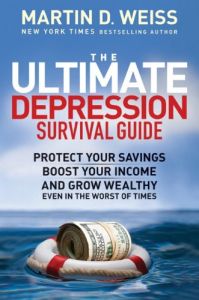
Read or listen offline
Recommendation
In this savings and investment “survival guide,” financial publisher Martin D. Weiss proclaims that the world is entering another depression. According to the U.S. Government Accountability Office, his investment advisory and rating firm outperforms all other companies at “forecasting future financial trouble.” Indeed, for two decades, Weiss has accurately predicted “nearly every large financial failure in the United States,” including the latest financial collapse. When it comes to doom-and-gloom financial prognostications, Weiss has excellent bloodlines. His father, J. Irving Weiss, was one of the few economists who predicted the Great Depression at the time. So what does this modern-day Cassandra have to tell us? Weiss claims that as wretched as things are now economically, they will get much worse in the years to come. However, in addition to dismal tidings, he offers numerous specific, well-informed recommendations on how to protect – and even increase – your assets during the “Second Great Depression of modern times.” getAbstract suggests that if you want to study fiscal advice that covers the spectrum from pessimism to optimism, this book expertly handles the pessimistic end.
Take-Aways
About the Author
Martin D. Weiss, Ph.D., is the founder and CEO of a financial services and investment publishing firm. Fluent in nine languages, Weiss chairs the nonprofit Sound Dollar Committee, an organization his father originally created to help balance the U.S. budget.
















Comment on this summary or Iniciar a Discussão